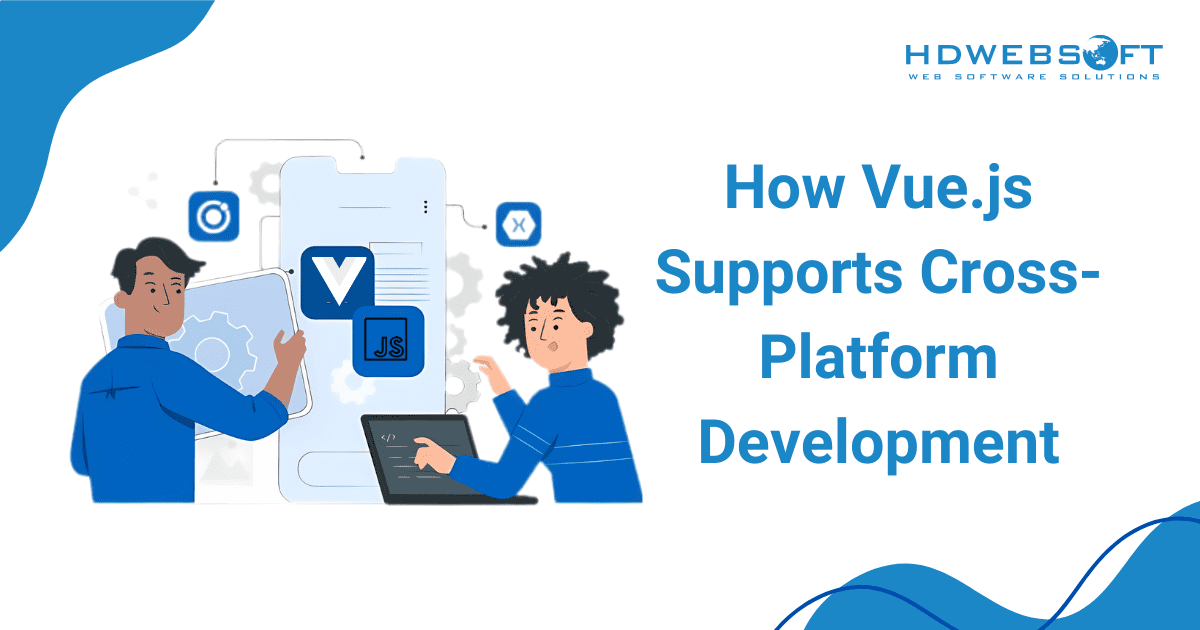
How Vue.js Supports Cross-Platform Development
In today’s digital era, the need for applications that seamlessly adapt across multiple platforms is paramount. This is where Vue.js shines. As a progressive JavaScript framework, Vue.js has become a popular choice for cross-platform development due to its flexibility, robust ecosystem, and ability to streamline the development process.
This blog will delve into how Vue.js empowers cross-platform development. We’ll also explore the key factors that make it a preferred solution for developers aiming to reach a wider audience without duplicating efforts.
Understanding Cross-Platform Development

Cross-platform development refers to the practice of creating software applications that are compatible with multiple operating systems and platforms using a single codebase. This approach contrasts with native development, where separate codebases are needed for platforms such as mobile, website, and web applications. Cross-platform development offers significant advantages, including reduced development time and cost, consistent user experience across platforms, and easier maintenance.
Vue.js as a Cross-Platform Solution
Vue.js, a progressive JavaScript framework, stands out due to its focus on simplicity and flexibility. This framework is designed for incremental adoption, its core library concentrates solely on the view layer. For that reason, it can integrate seamlessly with existing projects or other libraries. As a result, this versatility empowers developers to craft web, mobile, and even desktop applications.
Vue.js is particularly well-suited for the development of cross-platform thanks to its ease of use, strong community support, and robust features like component testing. Consequently, it allows developers to isolate and test individual components, ensuring the overall application functions flawlessly across various platforms.
Frameworks and Tools for Cross-Platform Development with Vue.js

Several frameworks and tools extend Vue.js capabilities to support cross-platform development:
Quasar Framework
As the demand for cross-platform applications soars, Vue.js developers have a powerful ally in Quasar. This is because the comprehensive framework streamlines development by offering a rich pre-built components and utilities suite.
Moreover, Quasar empowers developers to craft high-performing applications that seamlessly run on the web, mobile, and even desktop environments. This flexibility, coupled with Quasar’s robust tools, allows developers to focus on core functionalities and deliver exceptional user experiences across diverse platforms.
To learn more, visit their website here.
NativeScript-Vue
Embracing the strengths of both Vue.js and NativeScript, NativeScript-Vue empowers developers to bridge the gap between web and mobile development. This innovative framework streamlines the creation of native iOS and Android applications using a single codebase written in Vue.js.
This translates to faster development cycles and the ability to leverage the extensive functionality of native APIs and components. At the same time, developers can maintain the familiarity and ease of use offered by Vue.js.
To learn more, visit their website here.
Vue Native
Vue Native is a game-changer for developers familiar with Vue.js who want to conquer the cross-platform development world. Specifically, it acts as a bridge between Vue.js and React Native, allowing you to utilize the familiar syntax and structure of Vue.js. As a result, you can craft native-looking mobile applications that run seamlessly on both iOS and Android.
Furthermore, this eliminates the need to learn a completely new framework, which accelerates the development process. In turn, it empowers you to leverage your existing Vue.js knowledge to build cross-platform mobile apps efficiently.
To learn more, visit their website here.
Benefits of Using Vue.js for Cross-Platform Development

Vue.js has rapidly risen as a favorite for cross-platform development, and for good reason. Here’s what makes it such a compelling choice:
Single Codebase
The framework offers a compelling advantage for developers aiming to build cross-platform applications. It eliminates the need to rewrite code for different operating systems by leveraging a single codebase. As a result, this streamlined approach translates to significant time savings and reduced development effort.
Furthermore, developers can focus on crafting core functionalities and user experiences that translate seamlessly across platforms. This approach not only ensures a quicker path to market but also allows for more efficient resource allocation.
Reusable Components
Vue.js embraces a component-based architecture, which encourages developers to break down user interfaces into smaller, reusable building blocks. These components encapsulate both the visual template and its underlying logic, promoting code maintainability and reusability.
Moreover, this approach not only simplifies complex UIs but also fosters efficiency. Components can be effortlessly shared and integrated across different sections of a single application or even utilized in entirely separate projects. Therefore, this reusability translates to faster cross-platform development times and fosters consistency in design patterns throughout your codebase.
Strong Ecosystem
Vue.js empowers developers to create versatile applications that seamlessly run across platforms. Additionally, its rich ecosystem provides a treasure trove of libraries, tools, and frameworks specifically designed for cross-platform applications.
As a result, this “one-stop shop” approach equips developers with everything they need to build robust and adaptable applications. Offering all necessary tools and resources in one place eliminates the need to cobble together solutions from various sources.
Active Community
Vue.js boasts a thriving and expansive community, providing developers with a wealth of resources at their fingertips. The Vue.js ecosystem provides comprehensive documentation, informative tutorials, and a vast array of third-party plugins. Together, these resources empower developers to find solutions, explore best practices, and streamline the development process.
Performance
Vue.js, alongside its complementary frameworks, empowers developers to build high-performing applications. This translates to a seamless and responsive user experience, ensuring your applications perform flawlessly across a variety of platforms.
Challenges When Using Vue.js for Cross-Platform Development

While Vue.js offers numerous benefits for cross-platform development, it is not without challenges and limitations:
Learning Curve
Vue.js is widely praised for its user-friendly approach and intuitive design. However, it does require a foundational knowledge of JavaScript and an understanding of reactive programming concepts.
As a result, developers who are entirely new to the framework or these programming principles might encounter a slight learning curve as they adapt to its features and methodologies.
Performance Trade-offs
Development across all platforms offers a compelling path to reach a wider audience with a single codebase.
However, aiming for native-like performance across all platforms can present challenges, especially for complex applications where every bit of efficiency counts.
In these scenarios, carefully evaluating the trade-offs between development speed and raw performance becomes crucial for choosing the most suitable approach.
Platform-Specific Customizations
A unified codebase in this front-end framework offers many advantages. However, achieving a seamless user experience for cross-platform development may still require extra effort.
In particular, certain customizations and optimizations for each platform may be necessary. They demand developer expertise to ensure optimal performance and user experience.
Read more: How Vue.js Adapt to Microservice structures.
Diverse Use Cases of Vue.js Development

Initially created to enhance user interfaces, Vue.js has become a go-to tool for developers seeking to build diverse applications across various industries. Let’s see some popular Vue.js use cases:
Web Applications and Single-Page Applications (SPAs)
One of the most common use cases for Vue.js is in building web applications, particularly SPAs. This is because Vue.js is designed to make the development of dynamic and interactive interfaces seamless.
In addition, it allows developers to build web pages where the content dynamically updates without reloading the entire page. Consequently, this ability makes Vue.js ideal for SPAs, which rely on delivering a fast, fluid, and responsive user experience.
Vue’s component-based architecture significantly simplifies the management of complex UI elements, allowing for faster cross-platform development cycles and easier debugging. Platforms like Alibaba and Xiaomi utilize Vue.js for creating high-performance SPAs, which enhance the overall browsing experience of millions of users.
Progressive Web Applications (PWAs)
In addition to traditional web applications, Vue.js is also commonly used in the development of PWAs. PWAs combine the best of both web and mobile applications. They offer features such as offline access, push notifications, and better performance while still running in a web browser.
When combined with tools like Vue CLI and Nuxt.js, Vue.js allows developers to build PWAs. This combination provides fast, reliable, and engaging user experiences, even under poor network conditions.
For businesses seeking to provide an app-like experience without requiring users to download a native app, Vue.js serves as an excellent solution. Companies like Twitter have integrated PWAs to offer fast, reliable user interfaces on both desktop and mobile platforms.
Mobile Applications
Although Vue.js is typically associated with web development, it is also increasingly being used for cross-platform development in mobile applications.
For example, NativeScript allows Vue.js developers to create mobile applications for both iOS and Android from a single codebase. This cross-platform capability is crucial for businesses looking to minimize development costs while maximizing their reach across different platforms.
In addition, with the Quasar Framework, developers can create high-performance, responsive mobile applications using Vue.js. It means that the same codebase can serve both web and mobile needs, streamlining development and ensuring consistency across platforms. Moreover, this flexibility allows for faster development cycles and easier maintenance.
Desktop Applications
Another interesting use case for Vue.js is the development of desktop applications. Using Electron, a framework for building desktop apps with web technologies, developers can create cross-platform desktop applications using Vue.js. Specifically, Electron packages web applications into Windows, macOS, and Linux desktop apps, thereby enabling code reuse across platforms.
Nevertheless, GitHub’s Atom text editor and Slack’s desktop version use Electron, demonstrating the framework’s ability to deliver robust desktop applications. For Vue.js developers, Electron opens up new possibilities by offering the chance to leverage existing skills for cross-platform development to build full-featured desktop applications.
E-commerce Platforms
In the world of e-commerce, Vue.js development has found significant traction. The flexibility of Vue.js, combined with its capability to create dynamic, responsive interfaces, makes it an ideal framework for e-commerce websites. It integrates easily with backend technologies, enabling developers to build feature-rich e-commerce platforms that provide smooth and interactive customer experiences.
Platforms like Vue Storefront, an open-source e-commerce PWA built on Vue.js, enable businesses to implement headless commerce. This approach separates the front-end from the back-end to enhance performance and scalability. Brands looking to provide seamless shopping experiences with faster loading times have increasingly adopted Vue.js in their development strategies.
Real-Time Applications
Vue.js is also effective for building real-time applications like chat apps, collaboration tools, and live dashboards. Such applications require dynamic updates of data on the interface without refreshing the page.
Fortunately, Vue.js, paired with backend services like WebSockets or Firebase, can efficiently handle real-time data rendering in cross-platform development. As a result, this ensures that users receive the most up-to-date information without delays.
Platforms that require constant interaction, such as Trello for project management, benefit greatly from the capabilities of this framework. Similarly, real-time messaging platforms also leverage Vue.js to enhance their functionality and user experience. Its lightweight nature and efficient data-binding make it ideal for managing the continuous flow of information in real-time apps.
Conclusion
In short, Vue.js is a powerful and flexible framework that supports efficient, scalable cross-platform development across industries. It enables developers to build applications that run seamlessly on web, mobile, and desktop platforms. While challenges and limitations exist, the benefits of using Vue.js for cross-platform development make it a compelling choice for many projects.
As the demand for cross-platform solutions continues to grow, Vue.js remains at the forefront, empowering developers to deliver consistent and efficient user experiences across all platforms. This flexibility makes it an excellent choice for businesses looking to create scalable, high-performance applications.
As a trusted Vue.js development company, HDWEBSOFT specializes in creating dynamic and scalable solutions. Whether you need a small project or a long-term partnership, we can bring your ideas to life with tailored solutions.
So if you’re looking to hire Vue.js developers, our team can provide the expertise and innovation required to bring your projects to life. Our expertise extends across various industries, ensuring that your application is robust, secure, and adaptable to evolving business needs.









